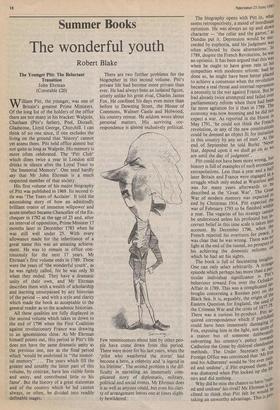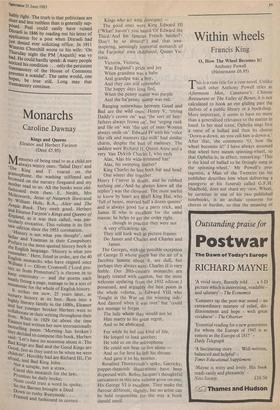Summer Books
The wonderful youth
Robert Blake
The Younger Pitt: The Reluctant Transition John Ehrman (Constable £20) William Pitt, the younger, was one of Britain's greatest Prime Ministers. Of the long list of the holders of the office there are not many in his bracket: Walpole, Chatham (Pitt's father), Peel, Disraeli,
Gladstone, Lloyd George, Churchill. I can think of no one since, if one excludes the living on the ground that 'history' cannot yet assess them. Pitt held office almost but not quite as long as Walpole. His memory is more often celebrated. The 'Pitt Club' which dines twice a year in London still drinks in silence after the Loyal Toast to 'the Immortal Memory'. One need hardly say that Mr John Ehrman is a much respected member of that society.
His first volume of his major biography of Pitt was published in 1969. Its second ti- tle was 'The Years of Acclaim'. It told the astonishing story of how an admittedly brilliant orator of immense willpower and acute intellect became Chancellor of the Ex- chequer in 1782 at the age of 23 and, after an interval of opposition, Prime Minister 17 months later in December 1783 when he was still well under 25. With every allowance made for the inheritance of a great name this was an amazing achieve- ment. He was to remain in office con- tinuously for the next 17 years. Mr Ehrman's first volume ends in 1789. These were the years of 'the wonderful youth', as he was rightly called, for he was only 30 when they ended. They have a dramatic unity of their own, and Mr Ehrman describes them with a wealth of scholarship and learning unsurpassed by any historian of the period — and with a style and clarity which made the book as acceptable to the general reader as to the academic historian.
All these qualities are fully displayed in the second volume which takes us down to the end of 1796 when the First Coalition against revolutionary France was drawing to an ignominious close. As Mr Ehrman himself points out, this period in Pitt's life does not have the same dramatic unity as the previous one, nor as the final period which 'would be enshrined in "the immor- tal memory" ... The years which fill the greater and notably the latter part of this volume, by contrast, have less visible form and unity, and contributed little to his fame'. But the history of a great statesman and of the country which he led cannot always, or often, be divided into readily definable stages. There are two further problems for the biographer in this second volume. Pitt's private life had become more private than ever. He had always been an isolated figure, utterly unlike his great rival, Charles James Fox. He confined his days even more than before to Downing Street, the House of Commons, Walmer Castle and Holwood, his country retreat. He seldom wrote about personal matters. His surviving cor- respondence is almost exclusively political.
Few reminiscences about him by other peo- ple have come down from this period. There were more for his last years, when the 'pilot who weathered the storm' had become a hero, a celebrity and 'a legend in his lifetime'. The second problem is the dif- ficulty in narrating an immensely com- plicated story of diplomatic, military, political and social events. Mr Ehrman does it as well as anyone could, but even his clari- ty of arrangement leaves one at times slight- ly bewildered.
The biography opens with Pitt in, what seems retrospectively, a mood of inordinate optimism. He was always an up and down character — 'the cellar and the garret,' as Dundas put it. Depression would be suc- ceeded by euphoria, and his judgment was often affected by these alternations. In 1789, despite the French Revolution, he was an optimist. It has been argued that this was when he ought to have given rein to his sympathies with moderate reform: had he done so, he might have been better placed to achieve a consensus when the revolution became a real threat and internal repression a necessity in the war against France. But he had already twice attempted and failed over parliamentary reform when there had been far more agitation for it than in 1789. The economy was now booming and he did not expect a war. As reported in the House in May 1791, 'he could not think the French revolution, or any of the new constitutions could be deemed an object fit for imitation in this country by any set of men'. At the end of September he told Burke 'Never fear, depend upon it we shall go on as we are until the day of judgment'. Pitt could not have been more wrong, but history is full of examples of such erroneous extrapolations. Less than a year and a half later Britain and France were engaged in struggle which only ended at Waterloo and was for many years afterwards to he described as the 'Great War'. The Great
War of modern memory was expected to end by Christmas 1914. Pitt expected the war of February 1793 to be finished within a year. The vagaries of his strategy cann°t be understood unless his profound but in'
correct belief in this time scale is taken into account. By December 1796, when the. French rejected his overtures for peace, ti
was clear that he was wrong. There was na light at the end of the tunnel, no prospect af his achieving the domestic reforms on which he had set his sights.
The book is full of fascinating insights One can only select arbitrarily. A strange episode which perhaps has more than a Pa,r; ticular individual significance is Pitt., behaviour toward Fox over the Ochako" Affair in 1789. This was a complicated in: broglio concerning a Russian port on Black Sea. It is, arguably, the origin of Ulf Eastern Question for England, the seed
..°,,'
the Crimean War and the crisis of 1877 There was a curious by-product. Pitt ac quired correspondence which if publishetoe could have been immensely damaging of Fox, exposing him in the light, not quire ,„ a traitor but of someone deliberate11 subverting his country's policy towaree Catherine the Great by disloyal clandestlabe methods. The Under Secretary at ,..to Foreign Office was convinced that 'Mr r„, and his Adherents' would be ' for ever ro'"e ed and undone', if Pitt exposed them. ,e't, was dismayed when Pitt locked up the I ters and did nothing.
Why did he miss the chance to have r ed and undone' his rival? Mr Ehrman is to dined to think that Pitt felt he would be taking an unworthy advantage. This is Pre
ba. bly right. The truth is that politicians are nicer and less ruthless than is generally sup- Posed. Peel could easily have ruined Disraeli in 1846 by reading out his letter of a. Pplication for a post when Disraeli had Just denied ever soliciting office. In 1911 Winston Churchill wrote to his wife: 'On Thursday night the PM [Asquith] was vy bad. He could hardly speak: & many people noticed his condition ... only the persistent freemasonry of the House of Commons prevents a scandal'. The same would, one hopes. be true still. Long may that freemasonry continue.



















































 Previous page
Previous page